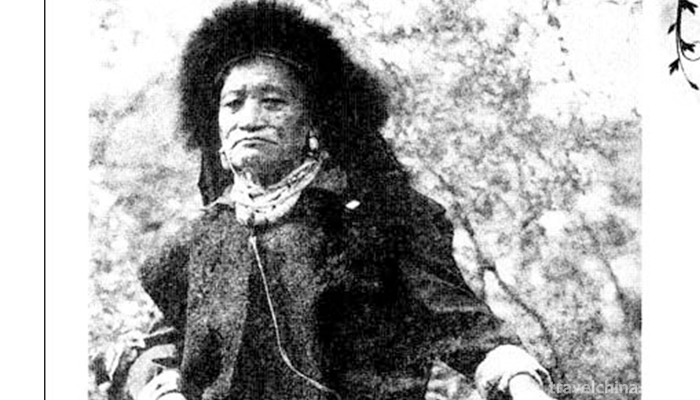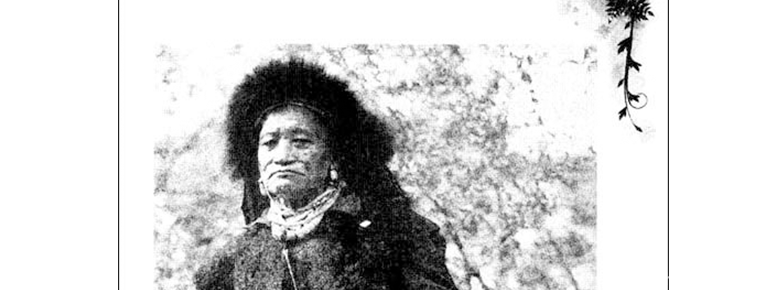Legend of the Ancestors of the Loba Nationality
Legend of the Ancestors of the Loba Nationality
The legend of the ancestors of the Loba nationality is an organic part of the life of the Loba people, a mirror of the Loba society and a way of existence of the folk life of the Loba people.
The legend of the ancestors of the Loba nationality has successfully declared the national intangible cultural heritage protection project, which will be more conducive to the protection of the folk culture of Loba.
On May 23, 2011, the "Legend of the Ancestors of the Loba Nationality" declared by Milin County of Tibet Autonomous Region was listed in the third batch of national intangible cultural heritage list with the approval of the State Council.
Historical origin
The Loba nationality mainly distributes in the Loyu area in southeastern Tibet and adjacent counties such as Chayu, Motu and Milin. The word "Loba" originates from Tibetan, which means "Southerners" and is the Tibetan appellation for them. Since ancient times, the Loba people have lived in the foothills of the Himalayas. Because of the high mountain barrier, the Loba people have little contact with the outside world and the social development is slow. Until the 1950s, the Loba tribes were still using the original way of slash and fire to engage in agricultural production, planting maize, upland rice and other miscellaneous grains.
The Loba people living in the northern part of Metou County use Tibetan, while the other Loba people use Loba. The Loba language belongs to the Zang-Burmese language family of the Sino-Tibetan language family. The dialects of the Loba people in different areas are different. Before the founding of the People's Republic of China, the Loba people also used carved wooden knots to record things. There is no native language, and a few people speak Tibetan. The Loba people believe in the primitive religion of animism.
primary coverage
Abadani, the ancestor of the Loba people, originally lived in Gongbu, but later moved to Baden Banga, Milin Village, where he settled for a period of time. Abadani had three sons, the eldest was Dangbang, the second was Dangjian, and the third was Dangjian. Abadani's three sons migrated southward in three ways and entered the Loyu area. When Bang took his two sons westward and southward through the Lilonggou, and crossed Sedanloya to settle in the Degen area, their descendants became the later Degen tribes. On that day, Bang and his two sons lived in the Nayu Valley (now in the area of Nanyi). When their descendants, the Bo and Garbo brothers, crossed the Nayudongla along the valley southward, and arrived at the place of Delen Bang. In archery competitions, Garbo's arrows landed on both sides of the fruit, the later Manigan; Garbo followed the direction of the arrows and settled there, and his descendants were Bogars.
After one beautiful legend after another, it is a festival after another. Festival culture is one of the most obvious characteristics that distinguish the Loba nationality from other nationalities.
Gesang, Deputy Minister of Propaganda Department of Milin County Committee accompanied by interviews along the way, told reporters that due to the dispersed living and inconvenient transportation of the Loba people, the dates of the annual festivals vary from place to place, usually after the annual labor. In the festivals of the Loba people, "Gongbu Festival" is the most famous. "Gongbu Festival" is the Tibetan calendar October 1, is the most grand festival of the year in Gongbu area (Milin County, Linzhi County, Gongbu Jiangda County). During the Gongbu Festival, organs, enterprises and institutions in Linzhi District have to take holidays, and the festival atmosphere is warm from the city to the countryside.
Forms of expression
Loba song, dance and music have the most national characteristics and are an important part of the spiritual culture of the Loba people. The Loba people often invite folk singers to perform in their labor, especially in festivals, religious ceremonies and other collective activities. The forms of performance are solo, duet and chorus. When singing, the folk singer usually touches the scene in the traditional tune, has the feeling and sends out, exports for the song. The content of the song is mostly based on the ancient myths, legends and stories of the Loba people, or on the political, historical, natural common sense, family and marriage in reality, and depicts the colorful life of the Loba people from different perspectives.
The clothes of the Loba people are obviously different from those of the Tibetans. Owing to their long hunting years, Loba men usually cross long knives, wear fur hunting clothes and fur caps. Women wear short shirts with round collar and narrow sleeves, skirts with tight lower body and wrapped legs. The waist and neck of both men and women are covered with heavy ornaments. Both men and women of the Loba nationality like to wear a sophisticated belt, which is made of rattan, leather, wool and various color patterns. The belt is used not only to tie the dress, but also to hang knives, sickles and other ornaments made of copper and shellfish.
The living customs of the Loba people are deeply influenced by the Tibetans, and their daily diet and food preparation methods are basically the same as those in the Tibetan agricultural areas. He likes roast meat, dried meat, milk dregs and buckwheat cakes, especially millet-stirred rice dumplings and chili peppers. I like to eat a kind of buckwheat cake baked on the slate. This kind of buckwheat cake smeared with chili paste and cheese while it is hot is very sweet and delicious. Both men and women like chili pepper, snuff and alcohol.
Inheritance status
The totem worship of the tribes and clans of the Loba Nationality has been carried on from generation to generation until today. This legacy is an important form of ancient primitive religious beliefs of mankind. They prayed for the blessings of ghosts and gods, often killed animals and sacrificed ghosts or asked wizards to recite sutras, and used witchcraft to restrain ghosts.
Inheritance significance
The legend of the ancestors of the Loba people is an integral part of the life of the Loba people, a mirror of the Loba society, and a way of existence of the folk life of the Loba people. People can see the historical development of the Loba people from the legend, which leaves precious and living historical data of life and culture for future generations.
The legend of the ancestors of the Loba nationality has successfully declared the national intangible cultural heritage protection project, which will be more conducive to the protection of the folk culture of Loba, and more conducive to the inheritance and development of the project.


-
1.Slender West Lake
Slender West Lake, formerly known as Guarantee Lake, is located in the northwest suburb of Yangzhou City, Jiangsu Province
Time 2018-12-06 -
2.Huizhou West Lake Scenic Spot
Huizhou West Lake scenic area is located in the central area of Huicheng in Guangdong Province, Southeast of Huizhou City, consisting of West Lake and the Red Lake, a total area of 20.91 square kilome
Time 2018-12-12 -
3.Qilihai National Wetland Park
Qilihai National Wetland Park is located in the northeast of Tianjin, located in Ninghe District of Tianjin, 30 kilometers away from Tianjin urban area, 100 kilometers away from Beijing and 40 kilomet
Time 2018-12-17 -
4.Kizil Gaha Peak Sui
Located on the east side of Saltwater Valley in the northwest of Kuqa County Town, Kizil Mahabi is a towering ancient military building with the meaning of "old red mouth" or "red sentr
Time 2018-12-23 -
5.Fulaishan Scenic Area
Fulaishan Scenic Spot, located about 8 kilometers west of Juxian County Town, is a national AAAA-level tourist scenic spot, provincial scenic spot, provincial geological heritage nature reserve, and i
Time 2019-01-12 -
6.Jinjiang hot spring
Jinjiang Hot Spring is located on the Bank of Jinjiang River, Datian Town, Enping City, which is the hometown of hot springs in China. It is backed by Qixingkeng primitive forest, deep mountains and g
Time 2019-01-29 -
7.Nanxiang ancient town
Jiading Nanxiang Ancient Town is a national AAAAA scenic spot, located in Nanxiang Town, Jiading District, Shanghai. There are famous scenic spots such as brick pagoda, Guyiyuan, Hebi Mountain, Liuyun
Time 2019-02-07 -
8.Da Yu memorial ceremony
The Dayu Festival is an ancient Chinese traditional folk sacrificial activity. Dayuling is located in Huiji Mountain, southeast of Shaoxing City, Zhejiang Province. Dayu Mausoleum is the burial place
Time 2019-04-23 -
9.Gulunmu Festival of Oroqen Nationality
The Oroqen ethnic group is one of the minorities with a small population in China. Since ancient times, it has multiplied and lived in the deep forest of Heilongjiang Valley and Xing'an Mountains
Time 2019-04-28 -
10.Eyebrow household
Eyebrow households, distributed in Shanxi, Shanxi, Shaanxi, Gansu, Western Henan and other provinces, also known as "Eyebrow Shao" or "confusion", are named for their euphemistic m
Time 2019-05-31 -
11.Yi Peoples Cigarette Box Dance
Yi cigarette box dance, the traditional dance of Hani Yi Autonomous Prefecture in Honghe, Yunnan Province, is one of the national intangible cultural heritage.
Time 2019-07-12 -
12.Yibin cultural characteristics
History of wine: Yibin has been a multi-ethnic area since ancient times. Relying on the customs and experience inherited from generation to generation, the people of all ethnic groups in this area have brewed their own historical wine in different historical peri
Time 2020-12-18